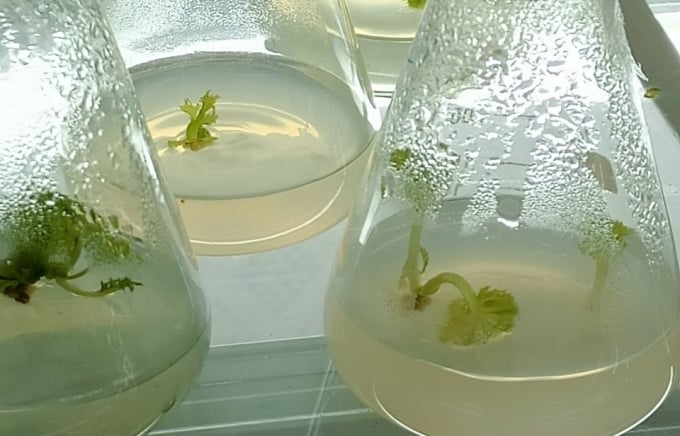May 24, 2025 | 13:24 GMT +7
May 24, 2025 | 13:24 GMT +7
Hotline: 0913.378.918
May 24, 2025 | 13:24 GMT +7
Hotline: 0913.378.918

The Ngoc Linh Ginseng with the scientific name of Panax Vietnamensis, is a rare herbal with the highest content of Saponin compared to other breeds of ginseng around the world.
According to the Department of Research and International Affairs (Hoang Lien National Park), the implementation of plant cell tissue culture technology is a new development direction of the contemporary agriculture industry. Recently, cadres working for the department have implemented a breeding model of Ngoc Linh Ginseng utilizing traditional methods through sowing seeds and the use of plant cell tissue culture technique accompanied by the latest technology.
The goal is to produce an excellent, high quality breed of the plant, and achieve high efficiency in the effort of preservation and development of rare genes in Sa Pa. There are also purposes to supply this breed to ethnic minorities living in the core area and the buffer zone of Hoang Lien National Park, contribute to the creation of jobs and reduce the pressure of doing harm to the forest in exchange to make a living.
The Ngoc Linh Ginseng with the scientific name of Panax Vietnamensis, is a rare herbal with the highest content of Saponin compared to other breeds of ginseng around the world. This special ginseng is categorized as a superior, high economic value plant. Ngoc Linh Ginseng specializes in improving health, extending lifetime, and preventing diseases.
Translated by Hoang Duy

(VAN) The People's Committee of Tra Vinh province has approved an adjustment to the investment policy for the Green Hydrogen Plant project, increasing its area to approximately 52.76 hectares.
![Reducing emissions from rice fields: [2] Farmers’ commitment to the soil](https://t.ex-cdn.com/nongnghiepmoitruong.vn/608w/files/news/2025/05/05/dsc08881jpg-nongnghiep-140632.jpg)
(VAN) Clean rice cultivation model in Thuong Tan commune, Bac Tan Uyen district, is assisting local residents in achieving sustainable agriculture by substantially reducing costs, increasing productivity, and protecting the environment.

(VAN) At the conference to disseminate Resolution No. 68, AgriS introduced its digital agricultural ecosystem and reaffirmed its commitment to accompanying the Government in promoting private sector development and sustainable agriculture.

(VAN) 'Blue Ocean - Blue Foods' initiative is designed to restore marine ecosystems and establish sustainable livelihoods for local communities by cultivating a minimum of 1,000 hectares of cottonii seaweed in the first three years.
/2025/05/21/4642-3-112707_603.jpg)
(VAN) The V-SCOPE project has made direct contributions to three out of six pillars of the Comprehensive Strategic Partnership between Vietnam and Australia.

(VAN) Facing the threat of rabies spreading to the community, Gia Lai province urgently carries out measures to vaccinate dogs and cats on a large scale.

(VAN) Disease-free livestock farming not only protects livestock herds but also stabilizes production and livelihoods for many farmers in Tuyen Quang.